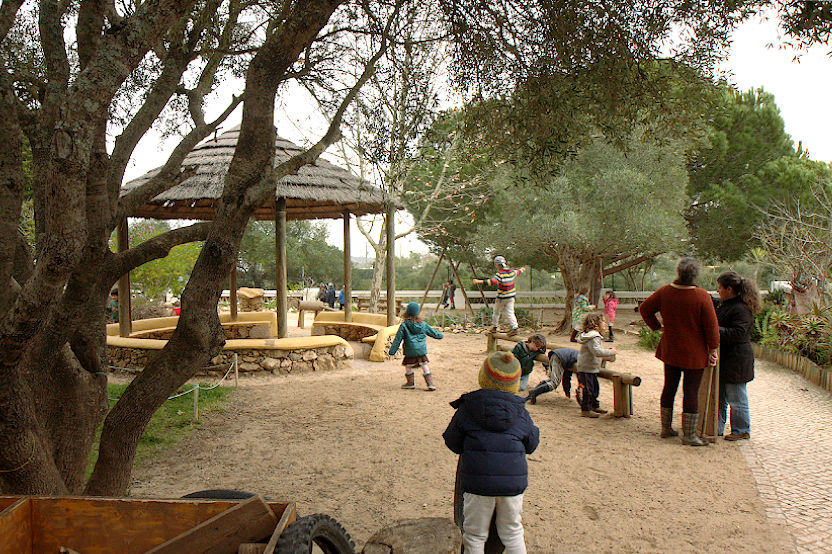One can only be helpful when the community is formed in the mirror of the human soul; and in the community lives the force of the individual soul.
Rudolf Steiner
Within the scope of the Waldorf Kindergarten, the families are an integral part of the organism which is seen as organic and alive. For this reason, the Administration of the Association allows Parents, Friends and Partners of the Kindergarten to participate, always keeping in mind that what unites us are the children and the aim to serve a higher good. In this way the Kindergarten and families have a very tight relationship through the dynamics of various councils and the objective to create ties and encourages cooperative work between everyone. This forms a wider team to co-participate and actively co-create this Kindergarten.
The children begin to attend our Kindergarten with different ages and different levels of development. In this way we strive to continue the individual process of each child moving from what they know to what is wished for in their transition to the next level of learning. As such the educative process is organized in a way to respect the individuality and characteristic of each child, giving a base for their development and self-learning and valuing their evolution both as an individual and in the group.
Being conscious of the individual process of each child and their path before attending the Kindergarten, we give an extreme importance to the registration process of each child, and their adaptation process in the Kindergarten. As such after the parents register the child we invite the parents for an individual interview. Preferably the child is not present, as it is a long interview with topics which should not be shared with the child. However, the child’s absence is not always possible. The objective of this initial interview is to get to know the family and the child better and discuss the phases of pre-conception, pregnancy, birth, and development until the present moment. The interview also gives space for parents’ questions, fears and expectations in relationship to the Waldorf Kindergarten. During this initial interview we also talk to the parents about Waldorf Pedagogy in general and how it applies to our Kindergarten in particular.

Before the beginning of the school year, we invite parents and new children for a work day where we prepare the classrooms, the garden, the toys and school materials among other necessary activities to begin the school year. In this way the children have contact with the space and pedagogic team before school starts, and they feel the involvement of their family at the Kindergarten. This develops in the child and in the parents a feeling of belonging and unity and the feeling that the family is part of the Kindergarten and vice-versa. In this way we give special attention to new children and their families, also providing a moment for new parents to meet and share their thoughts.
The home visits of the children and the shared experience of the child and parents outside of the educative space are also factors which help, not only in the moments of adaptation, but also throughout the child’s time in the Kindergarten.
The intellectual life of the Kindergarten blooms through the quality of the social life cultivated by the Waldorf Pedagogy which is always present. It also is seen through the daily routine which is performed with care and dedication. One can see the this easily as the children learn solidarity despite differences and they show how they learn from one another. Their individuality becomes part of the group spirit as they mutually accept each other and their differences and build a strong sense of themselves as intelligent, mediating, creative and dedicated beings. These competencies are, by themselves, a vital and powerful learning experience because it is experienced in community and lived through interdependence in which the children trade knowledge with each other.

The relationship of the families is experienced throughout each day, when the children arrive or leave, or occasionally when the families volunteer to actively participate in the day to day activities of the Kindergarten. Here the families do not feel like a universe apart, but rather part of the same universe which is the child. The family and the Kindergarten consciously and daily participate in the education of the being of the child and only in this way is it possible to have a complete and truly shared education.
We will continue the previously created project called “Parents’ Meeting,” an initiative which offers the creation of a space for reflection, sharing and the building of knowledge where the adults directly related to a child, or those interested in the Waldorf Pedagogy could meet periodically. They would meet to better understand and respond to the educational necessities of the child and of the human being throughout one’s life. These sessions of discussion and sharing can include topics such as the Education of a Child in the first seven years of life, the importance of play, Healthy rhythm, Sleep, Food, School Maturity, general Anthroposophy, Anthroposophic Medicine and many others. We try to address the needs and interests of the families and the pedagogic team. In some topics we are helped by the collaboration of guest speakers of a specific topic.
Through their collaboration in the Kindergarten, the parents become active participants in the life of the Kindergarten. In this way the education of the children is a shared task. It is also common that there are regular conversations with the parents, meetings about specific topics, practices or individuals, as well as visits to the children’s houses. These visits allow the possibility of parents and educators to meet and exchange their shared experiences.